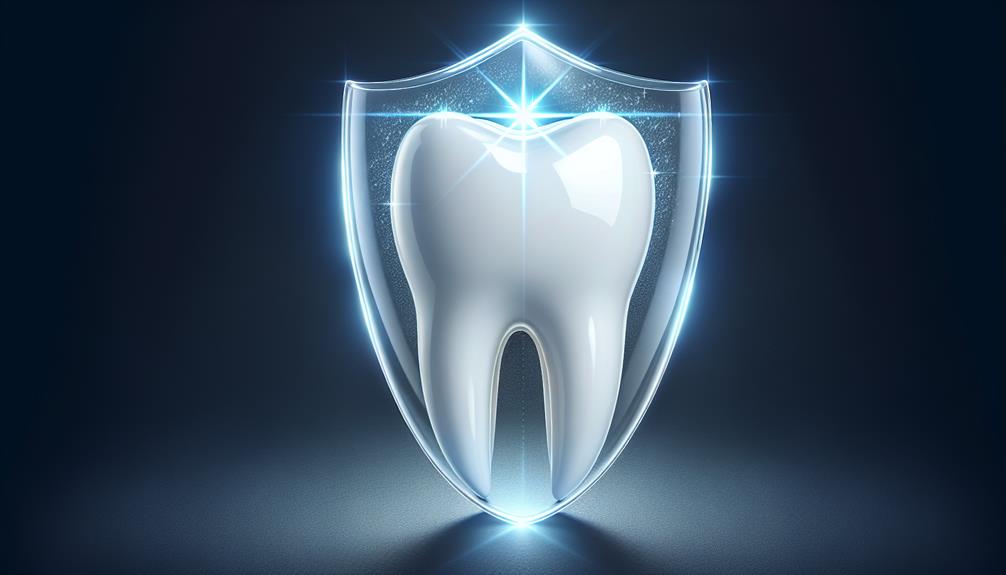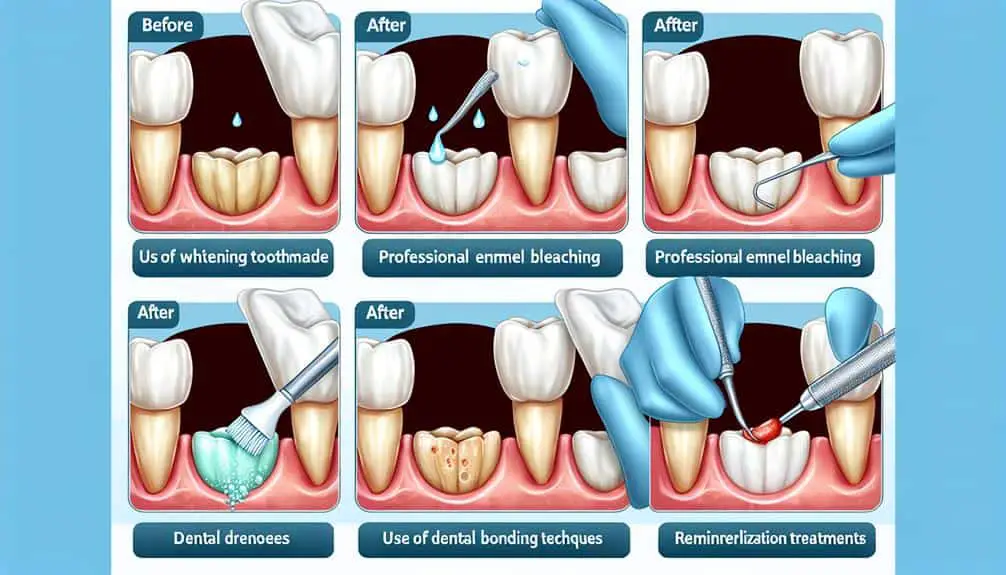Whitening plays a pivotal role in safeguarding your enamel by strengthening it and forming a protective shield against decay. By enhancing the durability of your enamel, whitening guarantees the overall health of your teeth in the long run. This process is essential in maintaining a healthy smile that not only looks good but also functions well. Investing in whitening procedures can go a long way in protecting your enamel and preserving your oral health.
Key Points
- Whitening strengthens enamel, acting as a protective barrier against decay.
- It enhances durability against acid attacks, preventing erosion.
- Regular maintenance reduces the risk of enamel erosion.
- Whitening creates a protective barrier on the tooth surface.
- Enamel health is extended beyond aesthetics, contributing to long-term protection.
Benefits of Whitening for Enamel Health
Whitening your teeth not only enhances your smile's appearance but also plays an important role in safeguarding the health of your enamel. The benefits of whitening extend beyond aesthetics to enamel strengthening, which is pivotal for maintaining good oral health. Enamel, the outer layer of your teeth, acts as a protective barrier against decay and damage. Through the whitening process, certain products contain ingredients like hydrogen peroxide that can help strengthen the enamel, making it more resilient to daily wear and tear.
However, it's imperative to note that some individuals may experience enamel sensitivity after whitening treatments. This sensitivity can occur due to the temporary exposure of the dentin layer beneath the enamel. Dentin contains microscopic tubules that lead to the tooth's nerve center, potentially causing discomfort. Understanding the connection between enamel sensitivity and whitening is crucial in selecting the right products or procedures that minimize these effects while still reaping the benefits of a brighter smile and healthier enamel.
How Whitening Prevents Enamel Erosion
To safeguard your enamel from erosion, it's important to understand the role of whitening in strengthening and protecting the outer layer of your teeth. Whitening plays a vital role in preventing enamel erosion by enhancing its strength and durability. Here's how whitening helps in preserving your enamel:
- Enamel Strengthening: Whitening treatments contain ingredients that can strengthen the enamel, making it more resistant to acid attacks that lead to erosion.
- Acid Protection: Whitening products create a protective barrier on the tooth surface, shielding the enamel from acids that can wear it down.
- Whitening Longevity: Regular whitening maintenance can help maintain the strength of your enamel over time, reducing the risk of erosion.
- Enamel Durability: By improving the overall durability of your enamel, whitening treatments contribute to long-term enamel health and protection against erosion.
Understanding how whitening supports enamel health is essential for preserving your teeth and ensuring their longevity.
Types of Whitening for Enamel Protection
When considering methods for safeguarding enamel, various types of whitening treatments offer distinct advantages in enhancing dental health and resilience.
Natural remedies like baking soda and hydrogen peroxide can help whiten teeth while also potentially strengthening enamel. These remedies work by gently removing surface stains and bacteria that could lead to enamel erosion if left unchecked.
DIY techniques such as oil pulling with coconut oil or using activated charcoal can also aid in whitening teeth and promoting enamel protection. Keep in mind that while natural remedies and DIY techniques can be effective, they may not provide the same level of whitening as professional treatments.
Incorporating these methods into your oral care routine can contribute to maintaining a healthy, bright smile while safeguarding your enamel. Remember to consult with your dentist before trying any new whitening methods to guarantee they're suitable for your dental health needs.
Professional Vs. At-Home Whitening for Enamel
For essential enamel protection, it's crucial to understand the differences between professional and at-home whitening methods. When considering how to whiten your teeth, here are some key points to keep in mind:
- Cost comparison: Professional whitening at the dentist's office can be more expensive upfront compared to at-home kits, which are generally more budget-friendly.
- Effectiveness analysis: Dentist-supervised whitening treatments often yield quicker and more noticeable results due to the higher concentration of bleaching agents used.
- Dentist recommendation: Dentists can assess your oral health and recommend the best whitening approach tailored to your specific needs, ensuring safety and effectiveness.
- DIY risks: At-home whitening kits may carry risks such as gum irritation or enamel damage if not used correctly, highlighting the importance of following instructions meticulously.
Understanding the pros and cons of each method can help you make an informed decision that aligns with your enamel protection goals.
Tips for Maintaining Whitened Enamel
Maintaining whitened enamel requires consistent oral hygiene practices and avoiding stain-causing habits. To preserve your bright smile, prioritize daily habits like brushing your teeth at least twice a day with a whitening toothpaste containing fluoride. Flossing daily helps remove plaque and prevent stains from developing between teeth. Additionally, using a whitening mouthwash can help maintain your enamel's brightness by reaching areas toothbrushes might miss.
Diet choices play a significant role in enamel maintenance. Limit consumption of stain-inducing beverages like coffee, tea, and red wine, or use a straw to minimize contact with your teeth. Acidic foods like citrus fruits can erode enamel, so rinse your mouth with water after eating them. Incorporate enamel-strengthening foods like dairy products, leafy greens, and crunchy fruits and vegetables into your diet.
Lastly, regular dental check-ups and professional cleanings are essential for monitoring your enamel's health and addressing any early signs of staining. By adopting these tips, you can effectively maintain your whitened enamel and keep your smile radiant.
Frequently Asked Questions
Can Whitening Treatments Be Harmful to Enamel in the Long Run?
If you're pondering the long-term impacts of whitening treatments on enamel, it's crucial to take into account enamel protection and whitening safety. Some products can potentially result in enamel damage over time, so choose wisely.
Are There Any Natural Remedies or DIY Methods for Whitening Enamel Safely?
To whiten enamel safely, consider natural remedies like baking soda or DIY methods such as oil pulling. While natural methods may yield slower results, they can be effective and gentle on enamel, promoting a healthier smile.
How Does Diet and Lifestyle Affect Enamel Health and Whitening Results?
To maintain enamel health and enhance whitening results, your diet impacts the acidity levels in your mouth. Lifestyle choices like smoking can stain enamel. Consuming enamel-friendly foods and avoiding acidic drinks can support whiter teeth.
Are There Any Specific Toothpastes or Mouthwashes That Can Help Maintain Whitened Enamel?
So, you want to maintain that pearly white smile? Look for whitening toothpastes and mouthwashes with gentle abrasives or peroxide. Professional whitening treatments can enhance and prolong the effects. Remember, consistency is key!
Can Enamel Be Permanently Damaged by Excessive or Incorrect Whitening Treatments?
Excessive or incorrect whitening treatments can permanently damage enamel, leading to sensitivity and other long-term effects. It's essential to prioritize enamel protection and remineralization to maintain oral health while achieving a brighter smile.



